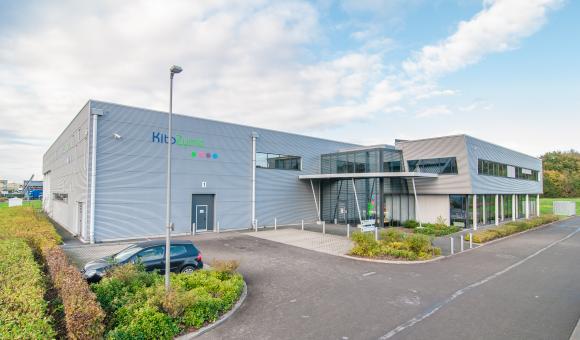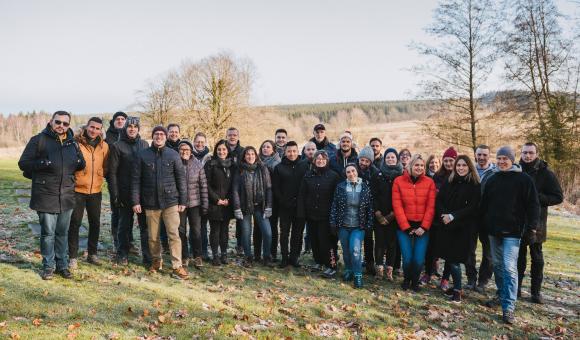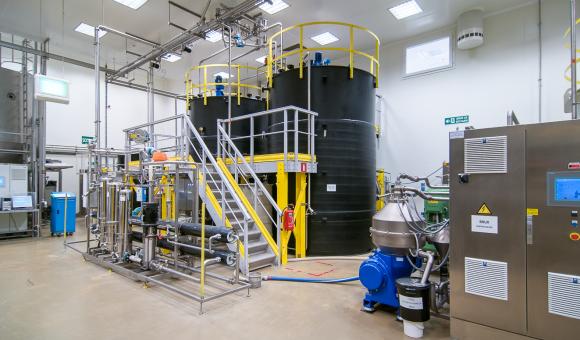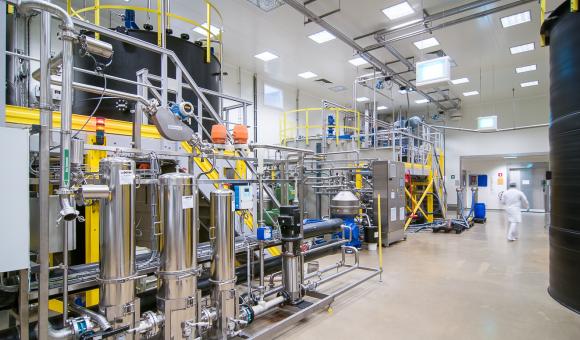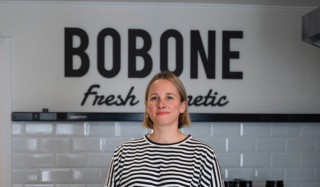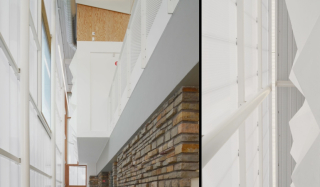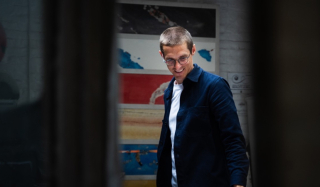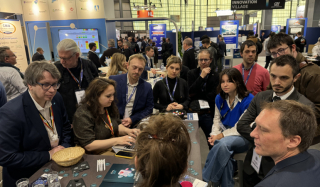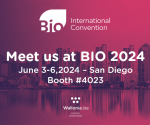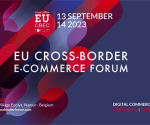Recently awarded the Grand Prix Wallonie à l'Exportation, KitoZyme is unique in the world, specialising in the use of fungal biomass to extract biopolymers and respond sustainably to health, agricultural and environmental issues. AWEX met with François Luthers, Chief Operating Officer, to discuss the advantages of a sustainable international development strategy. Strengthening the company's position and meeting the challenges of the future, the transition is now unavoidable. Meeting.
Wallonia Export-Investment Agency: Hello François Luthers. Before talking about sustainable development, could you tell us who KitoZyme is and what the company does?
François Luthers: KitoZyme is first and foremost the story of a spin-off created 20 years ago in the laboratories of the University of Liege. The initial project involved developing a technological platform dedicated to the extraction of high value-added molecules from mushroom waste. From the lab, we moved to Herstal, where we moved up to industrial scale in 2009. The project has resulted in us filing a patent family on processes and new molecules. What for, you may ask? We offer greener and healthier ingredients for health, wine and cosmetic applications. All our products are in fact vegetable alternatives to petrochemical derivatives or animal products. As well as our production, we continue to carry out Research & Development in the field of sustainable agriculture, which we believe to be one of the major challenges of the coming decades.
Could you give us a concrete example of application for polymer neophytes like us?
FL: Of course. For example, for wine, we are involved in the winemaking process with our molecules that can remove or eliminate undesirable bacteria and yeasts in the grape ripening process. Ultimately, they allow the farmer to reduce the risk of losing part of the crop.
You mentioned wine producers. So I guess you export to our neighbors?
FL: Yes, that's right. In fact, exports represent 97% of our sales. Every year we open up to new markets and currently work with almost 45 different countries. That said, each new market is a major challenge because there is always a lot of regulatory work to be done to become established abroad, especially in our field of innovation. It took more than 13 years of preparation before we were able to make our first major sales.
Why did it take so long?
FL: The challenge in our sector is that by regularly putting new molecules on the market, they have to be approved each time by the various health and scientific authorities, and that takes time. Each country has its own approach to our products, and different practices. This is even the case within the European market. For example, in agriculture, the regulations are different in Germany, Italy and Belgium.
You mentioned sustainable agriculture. What is your position on sustainable development? Is it a strategic issue for KitoZyme?
FL: Of course. In fact, sustainability is an integral part of our DNA. We are pursuing our strategy along two lines. The first is inherent to the specific nature of our products, which are designed to offer future generations technologies and solutions that meet current challenges without compromising the future. We believe that our mission is to use polymers to propose sustainable alternatives to petrochemicals (plastics, silicones) and to products of animal origin (gelatins or products banned by legislation or consumer pressure). In cosmetics and laundry products, we use certain biopolymers from mushrooms to encapsulate fragrances, instead of microplastics that pollute our oceans; in agriculture to replace certain fungicides; and in wine-making to replace sulphites or synthetic chemicals.
And the second line?
FL: Our second line is the role that KitoZyme must assume towards society as a whole. For example, we are fully committed to the circular economy. We buy co-products (waste) that we use and process to develop new products with high added value. These also replace harmful products (first line). We have been doing this since the start of our adventure, and we are pleased to see that Wallonia wants to push the circular economy further to the entire region...
But we can't stop there. We also generate waste, mainly organic, and recover it by producing 100% Walloon biogas. In short, we try to go as far as possible with what we have at our disposal. In addition to this circular economy work, we have implemented more traditional measures such as the production of solar energy and improvements in our water and energy consumption processes. Every year we manage to reduce our consumption, which is a significant environmental, energy and financial gain. This is the second line dedicated to the KitoZyme's societal role.
What about your staff, do they buy into the approach?
FL: The KitoZyme project has supported environmental values and been concerned with sustainability since its creation. So our (future) employees usually already have this mindset. There is a real company mission that produces a positive feeling in the staff and the (young) people who join us. In my opinion, taking sustainable development into account is a MUST for mobilising and motivating teams around a positive project.
What do you think are the main advantages of opting for a sustainable development strategy?
FL: I would say that for the company, it can obviously achieve economies of scale, particularly in terms of financial gains on its bills. There is also the issue of the image that the company projects. It is no longer possible to completely avoid sustainability issues. Companies that are still in denial are losing credibility, that's for sure. Lastly, there is the issue of staff motivation. As I have already said, we believe that this is essential, especially as a true 360° sustainability policy requires the support and involvement of the company's members. Otherwise, it will be perceived either as decisions disconnected from management or as unjustified constraints. We have to show that we are not just green with our customers, but also with ourselves; it's important.
Lastly, with the enthusiasm for sustainable development in recent years, offering "green" solutions to manufacturers, who are themselves looking for alternatives to make their activities more sustainable, offers a definite competitive advantage. Tens of thousands of companies are in the process of making the transition as well. Take advantage of this and offer them your products and solutions accordingly (laughs).
How do you see KitoZyme's strategy evolving?
FL: First of all, we have already seen very significant growth in our activities over the last two years in the fields of cosmetics, detergents and agriculture. Although we have always attracted interest from the academic world, more and more industrialists have been asking for our help over the past two years. The exponential interest in sustainable development issues is obviously not without reason, but regulatory developments are also pushing them, both in Europe and the United States. So we are very much in demand and that gives us a lot of hope.
Are you not afraid of competition?
FL: Competition is emerging, mainly from China. We feel that it is slowly coming, but it is up to us to highlight the quality of our products so we can stand out. At the moment, we are mainly interested in solutions for the agriculture of tomorrow. We win by anticipating and making sustainable proposals to markets that are increasingly demanding in this area.
What advice would you give to companies wanting to start their sustainable transition?
FL: If you want to start a transition to sustainable development in your company, in whole or in part, don't forget to consider the two areas of "product" and "society". Ask yourself, "What can I do so that my customers and I can reduce our environmental impact through my product solutions?" There is always something you can do, even for products that are not focused on sustainable development. For example, you can always improve your processes (packaging, energy, etc.) to make economic gains. While the economic aspect is obviously important, giving yourself a real mission, giving meaning to your activity, is essential.
Of course, take your transition step by step. Do not set overly ambitious goals from the beginning, but goals that can be reached quickly and easily, with the help of partners and other stakeholders such as companies and public authorities.
I will end on a "Wallonia Export-Investment Agency" note; you were recently awarded the Grand Prix Wallonie à l'Exportation in December 2020. What does this award mean to you?
FL: This trophy is great recognition for the company, and a much needed boost in an environment that is quite complicated this year. We can mention it when we go to visit our customers, and of course it will give us even more credibility.
Illustrations © KitoZyme
Author : Jonathan Avau (Wallonia Export)
